What Is The Thyroid?
Blue indicates link
The thyroid gland makes and stores hormones that help regulate the heart rate, blood pressure, body temperature, and the rate at which food is converted into energy. Thyroid hormones are essential for the function of every cell in the body. They help regulate growth and the rate of chemical reactions (metabolism) in the body. Thyroid hormones also help children grow and develop.
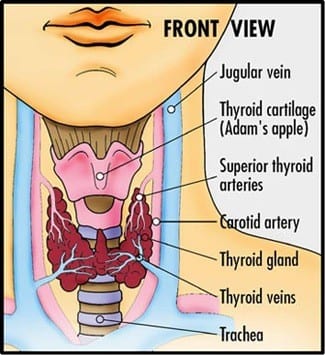
The thyroid, or thyroid gland, is an endocrine gland in the neck consisting of two connected lobes. The lower two-thirds of the lobes are connected by a thin band of tissue called the thyroid isthmus. The thyroid is located at the front of the neck, below Adam’s apple. Microscopically, the functional unit of the thyroid gland is the spherical thyroid follicle, lined with follicular cells (thyrocytes), and occasional parafollicular cells that surround a lumen containing colloid. The thyroid gland secretes three hormones: the two thyroid hormones – triiodothyronine, and thyroxine, and a peptide hormone, calcitonin.
The thyroid hormones influence the metabolic rate and protein synthesis, and in children, growth and development. Calcitonin plays a role in calcium homeostasis. The secretion of the two thyroid hormones is regulated by thyroid-stimulating hormone (TSH), which is secreted from the anterior pituitary gland. TSH is regulated by thyrotropin-releasing hormone (TRH), which is produced by the hypothalamus.
The thyroid gland develops in the floor of the pharynx at the base of the tongue at 3-4 weeks gestation; it then descends in front of the pharyngeal gut, and ultimately over the next few weeks, it migrates to the base of the neck. During migration, the thyroid remains connected to the tongue by a narrow canal, the thyroglossal duct. At the end of the fifth week, the thyroglossal duct degenerates, and over the following two weeks, the detached thyroid migrates to its final position.
Thyroid disorders include hyperthyroidism, hypothyroidism, thyroid inflammation (thyroiditis), thyroid enlargement (goiter), thyroid nodules, and thyroid cancer. Hyperthyroidism is characterized by excessive secretion of thyroid hormones: the most common cause is the autoimmune disorder Graves’ disease. Hypothyroidism is characterized by deficient secretion of thyroid hormones: the most common cause is iodine deficiency. In iodine-deficient regions, hypothyroidism secondary to iodine deficiency is the leading cause of preventable intellectual disability in children. In iodine-sufficient regions, the most common cause of hypothyroidism is the autoimmune disorder Hashimoto’s thyroiditis.
The presence of the thyroid and its various diseases have been noted and treated for thousands of years, although the gland itself has only been described and named since the Renaissance. Knowledge of the thyroid, its biochemistry, and its disorders developed throughout the late nineteenth and twentieth centuries. Many modern treatments and investigative modalities evolved throughout the mid-twentieth century, including refinement of surgical techniques for thyroid removal (thyroidectomy) for the treatment of goiter; the use of radioactive iodine and thiouracil for the treatment of Graves’ disease; and fine-needle aspiration for diagnosis of thyroid nodules.
Thyroid Problems:
6 Common Thyroid Disorders & Problems:
- Hyperthyroidism
- Hypothyroidism
- Hashimoto’s disease
- Graves’ disease
- Goiter
- Thyroid nodules
- Thyroid conditions in children
- Prevention
Hyperthyroidism:
In hyperthyroidism, the thyroid gland is overactive. It produces too much of its hormone. Hyperthyroidism affects about 1 percent of women. It’s less common in men.
Graves’ disease is the most common cause of hyperthyroidism, affecting about 70 percent of people with an overactive thyroid. Nodules on the thyroid — a condition called toxic nodular goiter or multinodular goiter — can also cause the gland to overproduce its hormones.
Excessive thyroid hormone production leads to symptoms such as:
- restlessness
- nervousness
- racing heart
- irritability
- increased sweating
- shaking
- anxiety
- trouble sleeping
- thin skin
- brittle hair and nails
- muscle weakness
- weight loss
- bulging eyes (in Graves’ disease)
Hyperthyroidism diagnosis and treatment:
A blood test measures levels of thyroid hormone (thyroxine, or T4) and thyroid-stimulating hormone (TSH) in your blood. The pituitary gland releases TSH to stimulate the thyroid to produce its hormones. High thyroxine and low TSH levels indicate that your thyroid gland is overactive.
Your doctor might also give you radioactive iodine by mouth or as an injection, and then measure how much of it your thyroid gland takes up. Your thyroid takes in iodine to produce its hormones. Taking in a lot of radioactive iodine is a sign that your thyroid is overactive. The low level of radioactivity resolves quickly and isn’t dangerous for most people.
Treatments for hyperthyroidism destroy the thyroid gland or block it from producing its hormones.
- Antithyroid drugs such as methimazole (Tapazole) prevent the thyroid from producing its hormones.
- A large dose of radioactive iodine damages the thyroid gland. You take it as a pill by mouth. As your thyroid gland takes in iodine, it also pulls in the radioactive iodine, which damages the gland.
- Surgery can be performed to remove your thyroid gland.
If you have radioactive iodine treatment or surgery that destroys your thyroid gland, you will develop hypothyroidism and need to take thyroid hormone daily.
Hypothyroidism:
Hypothyroidism is the opposite of hyperthyroidism. The thyroid gland is underactive, and it can’t produce enough of its hormones.
Hypothyroidism is often caused by Hashimoto’s disease, surgery to remove the thyroid gland, or damage from radiation treatment. In the United States, it affects around 4.6 percent of people 12 years old and older. Most cases of hypothyroidism are mild.
Too little thyroid hormone production leads to symptoms such as:
- fatigue
- dry skin
- increased sensitivity to cold
- memory problems
- constipation
- depression
- weight gain
- weakness
- slow heart rate
- coma
Hypothyroidism diagnosis and treatment:
Your doctor will perform blood tests to measure your TSH and thyroid hormone levels. A high TSH level and low thyroxine level could mean that your thyroid is underactive. These levels could also indicate that your pituitary gland is releasing more TSH to try to stimulate the thyroid gland to make its hormone.
The main treatment for hypothyroidism is to take thyroid hormone pills. It’s important to get the dose right because taking too much thyroid hormone can cause symptoms of hyperthyroidism.
Hashimoto’s disease:
Hashimoto’s disease is also known as chronic lymphocytic thyroiditis. It’s the most common cause of hypothyroidism in the United States, affecting about 14 million Americans. It can occur at any age, but it’s most common in middle-aged women. The disease occurs when the body’s immune system mistakenly attacks and slowly destroys the thyroid gland and its ability to produce hormones.
Some people with mild cases of Hashimoto’s disease may have no obvious symptoms. The disease can remain stable for years, and symptoms are often subtle. They’re also not specific, which means they mimic symptoms of many other conditions. Symptoms include:
- fatigue
- depression
- constipation
- mild weight gain
- dry skin
- dry, thinning hair
- pale, puffy face
- heavy and irregular menstruation
- intolerance to cold
- an enlarged thyroid, or goiter
Hashimoto’s diagnosis and treatment:
Testing the level of TSH is often the first step when screening for any type of thyroid disorder. Your doctor might order a blood test to check for increased levels of TSH as well as low levels of thyroid hormone (T3 or T4) if you’re experiencing some of the above symptoms. Hashimoto’s disease is an autoimmune disorder, so the blood test would also show abnormal antibodies that might be attacking the thyroid.
There’s no known cure for Hashimoto’s disease. Hormone-replacing medication is often used to raise thyroid hormone levels or lower TSH levels. It can also help relieve the symptoms of the disease. Surgery might be necessary to remove part or all of the thyroid gland in rare advanced cases of Hashimoto’s. The disease is usually detected at an early stage and remains stable for years because it progresses slowly.
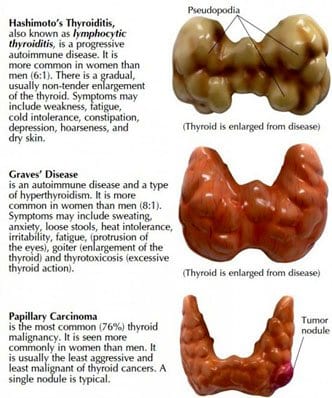
Graves’ disease:
Graves’ disease was named for the doctor who first described it more than 150 years ago. It’s the most common cause of hyperthyroidism in the United States, affecting about 1 in 200 people.
Graves’ is an autoimmune disorder that occurs when the body’s immune system mistakenly attacks the thyroid gland. This can cause the gland to overproduce the hormone responsible for regulating metabolism.
The disease is hereditary and may develop at any age in men or women, but it’s much more common in women ages 20 to 30, according to the Department of Health and Human Services. Other risk factors include stress, pregnancy, and smoking.
When there’s a high level of thyroid hormone in your bloodstream, your body’s systems speed up and cause symptoms that are common to hyperthyroidism. These include:
- anxiety
- irritability
- fatigue
- hand tremors
- increased or irregular heartbeat
- excessive sweating
- difficulty sleeping
- diarrhea or frequent bowel movements
- altered menstrual cycle
- goiter
- bulging eyes and vision problems
Graves’ disease diagnosis and treatment:
A simple physical exam can reveal an enlarged thyroid, enlarged bulging eyes, and signs of increased metabolism, including rapid pulse and high blood pressure. Your doctor will also order blood tests to check for high levels of T4 and low levels of TSH, both of which are signs of Graves’ disease. A radioactive iodine uptake test might also be administered to measure how quickly your thyroid takes up iodine. A high uptake of iodine is consistent with Graves’ disease.
There’s no treatment to stop the immune system from attacking the thyroid gland and causing it to overproduce hormones. However, the symptoms of Graves’ disease can be controlled in several ways, often with a combination of treatments:
- beta-blockers to control rapid heart rate, anxiety, and sweating
- antithyroid medications to prevent your thyroid from producing excessive amounts of a hormone
- radioactive iodine to destroy all or part of your thyroid
- surgery to remove your thyroid gland, a permanent option if you can’t tolerate antithyroid drugs or radioactive iodine
Successful hyperthyroidism treatment usually results in hypothyroidism. You’ll have to take hormone-replacement medication from that point forward. Graves’ disease can lead to heart problems and brittle bones if it’s left untreated.
Goiter:
Goiter is a noncancerous enlargement of the thyroid gland. The most common cause of goiter worldwide is an iodine deficiency in the diet. Researchers estimate that goiter affects 200 million of the 800 million people who are iodine-deficient worldwide.
Conversely, goiter is often caused by — and a symptom of — hyperthyroidism in the United States, where iodized salt provides plenty of iodine.
Goiter can affect anyone at any age, especially in areas of the world where foods rich in iodine are in short supply. However, goiters are more common after the age of 40 and in women, who are more likely to have thyroid disorders. Other risk factors include family medical history, certain medication usage, pregnancy, and radiation exposure.
There might not be any symptoms if the goiter isn’t severe. The goiter may cause one or more of the following symptoms if it grows large enough, depending on the size:
- swelling or tightness in your neck
- difficulties breathing or swallowing
- coughing or wheezing
- hoarseness of voice
Goiter diagnosis and treatment:
Your doctor will feel your neck area and have you swallow during a routine physical exam. Blood tests will reveal the levels of thyroid hormone, TSH, and antibodies in your bloodstream. This will diagnose thyroid disorders that are often a cause of goiter. An ultrasound of the thyroid can check for swelling or nodules.
Goiter is usually treated only when it becomes severe enough to cause symptoms. You can take small doses of iodine if the goiter is the result of iodine deficiency. Radioactive iodine can shrink the thyroid gland. Surgery will remove all or part of the gland. The treatments usually overlap because goiter is often a symptom of hyperthyroidism.
Goiters are often associated with highly treatable thyroid disorders, such as Graves’ disease. Although goiters aren’t usually a cause for concern, they can cause serious complications if they’re left untreated. These complications can include difficulty breathing and swallowing.
Thyroid nodules:
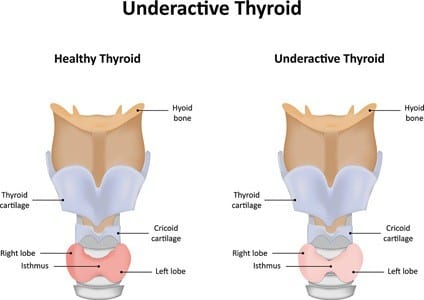
Thyroid nodules are growths that form on or in the thyroid gland. About 1 percent of men and 5 percent of women living in iodine-sufficient countries have thyroid nodules that are large enough to feel. About 50 percent of people will have nodules that are too tiny to feel.
The causes aren’t always known but can include iodine deficiency and Hashimoto’s disease. The nodules can be solid or fluid-filled.
Most are benign, but they can also be cancerous in a small percentage of cases. As with other thyroid-related problems, nodules are more common in women than men, and the risk in both sexes increases with age.
Most thyroid nodules don’t cause any symptoms. However, if they grow large enough, they can cause swelling in your neck and lead to breathing and swallowing difficulties, pain, and goiter.
Some nodules produce thyroid hormone, causing abnormally high levels in the bloodstream. When this happens, symptoms are similar to those of hyperthyroidism and can include:
- high pulse rate
- nervousness
- increased appetite
- tremors
- weight loss
- clammy skin
On the other hand, symptoms will be similar to hypothyroidism if the nodules are associated with Hashimoto’s disease. This includes:
- fatigue
- weight gain
- hair loss
- dry skin
- cold intolerance
Thyroid nodules diagnosis and treatment:
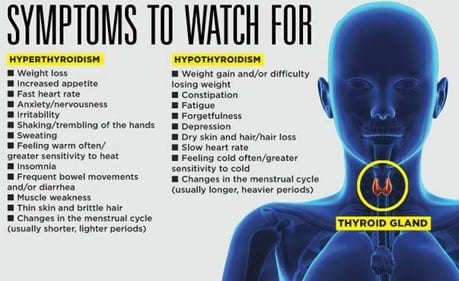
Most nodules are detected during a normal physical exam. They can also be detected during an ultrasound, CT scan, or MRI. Once a nodule is detected, other procedures — a TSH test and a thyroid scan — can check for hyperthyroidism or hypothyroidism. A fine-needle aspiration biopsy is used to take a sample of cells from the nodule and determine whether the nodule is cancerous.
Benign thyroid nodules aren’t life-threatening and usually don’t need treatment. Typically, nothing is done to remove the nodule if it doesn’t change over time. Your doctor may do another biopsy and recommend radioactive iodine to shrink the nodules if it grows.
Cancerous nodules are pretty rare — according to the National Cancer Institute, thyroid cancer affects less than 4 percent of the population. The treatment your doctor recommends will vary depending on the type of tumor. Removing the thyroid through surgery is usually the treatment of choice. Radiation therapy is sometimes used with or without surgery. Chemotherapy is often required if cancer spreads to other parts of the body.
Common thyroid conditions in children:
Children can also get thyroid conditions, including:
- hypothyroidism
- hyperthyroidism
- thyroid nodules
- thyroid cancer
Sometimes children are born with a thyroid problem. In other cases, surgery, disease, or treatment for another condition causes it.
Hypothyroidism:
Children can get different types of hypothyroidism:
- Congenital hypothyroidism occurs when the thyroid gland doesn’t develop properly at birth. It affects about 1 out of every 2,500 to 3,000 babies born in the United States.
- Autoimmune hypothyroidism is caused by an autoimmune disease in which the immune system attacks the thyroid gland. This type is often caused by chronic lymphocytic thyroiditis. Autoimmune hypothyroidism often appears during the teenage years, and it’s more common in girls than boys.
- Iatrogenic hypothyroidism happens in children who have their thyroid gland removed or destroyed — through surgery, for example.
Symptoms of hypothyroidism in children include:
- fatigue
- weight gain
- constipation
- intolerance to cold
- dry, thin hair
- dry skin
- slow heartbeat
- hoarse voice
- puffy face
- increased menstrual flow in young women
Hyperthyroidism:
There are multiple causes of hyperthyroidism in children:
- Graves’ disease is less common in children than in adults. Graves’ disease often appears during the teenage years, and it affects more girls than boys.
- Hyperfunctioning thyroid nodules are growths on a child’s thyroid gland that produce too much thyroid hormone.
- Thyroiditis is caused by inflammation in the thyroid gland that makes thyroid hormone leak out into the bloodstream.
Symptoms of hyperthyroidism in children include:
- fast heart rate
- shaking
- bulging eyes (in children with Graves’ disease)
- restlessness and irritability
- poor sleep
- increased appetite
- weight loss
- increased bowel movements
- intolerance to heat
- goiter
Thyroid nodules:
Thyroid nodules are rare in children, but when they do occur, they’re more likely to be cancerous. The main symptom of a thyroid nodule in a child is a lump in the neck.
Thyroid cancer:
Thyroid cancer is the most common type of endocrine cancer in children, yet it’s still very rare. It’s diagnosed in less than 1 out of every 1 million children under age 10 each year. The incidence is slightly higher in teens, with a rate of about 15 cases per million in 15- to 19-year-olds.
Symptoms of thyroid cancer in children include:
- a lump in the neck
- swollen glands
- tight feeling in the neck
- trouble breathing or swallowing
- hoarse voice
How are thyroid problems diagnosed?
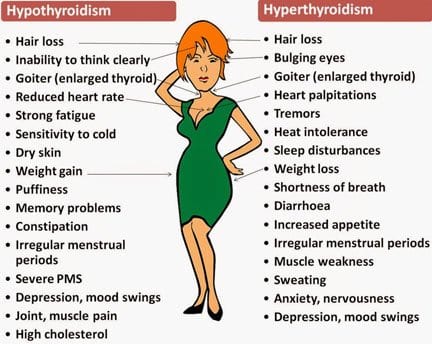
A doctor or other healthcare professional will take your medical history and give you a physical exam. Specialized tests are used to diagnose thyroid disorders. Blood tests may be used to help diagnose thyroid problems. Usually, imaging tests like ultrasound, radioactive thyroid scans, fine-needle aspiration, and biopsy of the thyroid gland are techniques ordered to measure levels of thyroid hormones and TSH in the blood.
Preventing thyroid dysfunction:
In most cases, you can’t prevent hypothyroidism or hyperthyroidism. In developing countries, hypothyroidism is often caused by iodine deficiency. However, thanks to the addition of iodine to table salt, this deficiency is rare in the United States.
Hyperthyroidism is often caused by Graves’ disease, an autoimmune disease that isn’t preventable. You can set off an overactive thyroid by taking too much thyroid hormone. If you’re prescribed thyroid hormone, make sure to take the correct dose. In rare cases, your thyroid can become overactive if you eat too many foods that contain iodine, such as table salt, fish, and seaweed.
Though you may not be able to prevent thyroid disease, you can prevent its complications by getting diagnosed right away and following the treatment your doctor prescribes.
5 Natural Remedies for Hypothyroidism:
The standard treatment for hypothyroidism is taking daily thyroid hormone replacement medication. Of course, medicines often come with side effects, and forgetting to take a pill might lead to more symptoms. In some cases, natural remedies may cause fewer side effects and fit into your overall lifestyle better.
Natural Remedies
The goal of natural remedies or alternative medicine is to fix the root cause of the thyroid problem. Thyroid problems sometimes start as the result of poor diet, stress, or missing nutrients in your body. Changing your diet and taking an herbal supplement are two ways you can help your thyroid condition. These options may have fewer side effects than taking thyroid medicine. Also, using an herbal supplement for the treatment of a low or underactive thyroid may be helpful for people who aren’t responding well to medicines.
Selenium
According to the National Institutes of Health (NIH), selenium is a trace element that plays a part in thyroid hormone metabolism. Many foods on the market today contain selenium, including grass-fed beef, tuna, turkey, and Brazil nuts.
Hashimoto’s thyroiditis, an immune system attack on the thyroid, often diminishes the body’s selenium supply. Supplementing this trace element has been shown to help balance thyroxine, or T4, levels in some people. It’s important to talk with your doctor about how much selenium may be right for you since every person is different.
Sugar-Free Diet:
Sugar and processed foods can lead to increased inflammation in the body. Inflammation can slow down the conversion of T4 to triiodothyronine, or T3, another thyroid hormone. This can make your symptoms and thyroid disease worsen.
Also, sugar only boosts your energy level in the short term, eliminating it from your diet may help regulate your energy levels. Additionally, removing sugar from your diet may help your skin and stress levels. It’s not easy to adopt a sugar-free diet, but the benefit to your thyroid health may be worth it.
Vitamin B
Taking certain vitamin supplements can have an impact on your thyroid health. Low thyroid hormones can affect your body’s vitamin B-12 levels. Taking a vitamin B-12 supplement may help you repair some of the damage your hypothyroidism caused.
Vitamin B-12 can help with the tiredness caused by thyroid disease. Thyroid disease also impacts your vitamin B-1 levels.
You can add more B vitamins to your diet with the following foods:
- peas
- asparagus
- sesame seeds
- tuna
- cheese
- milk
- eggs
Vitamin B-12 is generally safe for most healthy individuals at recommended levels. The vitamin should be used with caution if you have any of the following conditions:
- heart disorder
- high blood pressure
- history of cancer
- skin disorders
- discolored urine
- stomach issues
- anemia, due to abnormal potassium levels
- blood clotting disorders
- increased uric acid or gout
It’s important to talk with your doctor about how much vitamin B-12 may be right for you.
Probiotics:
The NIH is the link between hypothyroidism and small intestine problems. These problems included an overgrowth of bacteria, such as yeast. Probiotic supplements contain live bacteria that can help keep your stomach and intestines healthy. Besides supplement forms, fermented food and drink, such as kefir, kombucha, raw cheese, and yogurt contain useful probiotics.
However, the Food and Drug Administration has not approved the use of probiotics for the prevention or treatment of any condition. Talk with your doctor to see if these supplements might help you.
Gluten-Free Diet:
Adopting a gluten-free diet is more than a fad for many people with hypothyroidism. According to the National Foundation for Celiac Awareness, a significant number of people with thyroid disease also have celiac disease, which is a digestive disorder in which people cannot handle consuming gluten.
While research doesn’t currently support a gluten-free diet for the treatment of thyroid disease, many people with Hashimoto’s thyroiditis and hypothyroidism do feel better after cutting wheat and other gluten-containing foods from their diet.
But there are some drawbacks to going gluten-free. For one, the cost of buying gluten-free foods is often much higher than foods containing wheat. And some prepackaged, gluten-free foods aren’t healthy. That’s because these foods often have higher fat content and less fiber than wheat-containing products.
Related stories:
 Stress and Your Thyroid: What’s the Connection?
Stress and Your Thyroid: What’s the Connection? What Effect Does My Thyroid Have on My Cholesterol?
What Effect Does My Thyroid Have on My Cholesterol? You May Think I Look Healthy and Fit, But I Actually Live with an Invisible Illness
You May Think I Look Healthy and Fit, But I Actually Live with an Invisible Illness 10 Yoga Poses That Can Improve the Health of Your Thyroid
10 Yoga Poses That Can Improve the Health of Your Thyroid
As always please consult with your Doctor.
Natural, home remedies are nice but in some cases medication is necessary.
Thank you for reading,
Michael.
Comments are welcome




Thanks for the thorough article. Thyroid issues are so common and the symptoms can be really vague. Whenever someone is feeling crummy without a good obvious reason, I always ask when they had their thyroid checked. I also wonder if problems have increased since we don’t use iodized salt as much anymore.
Hi Katie,
Thank you for your comments. It is always better to be safe than sorry. I will look into the statics and include them in the article. Thank you for mentioning that.
Best wishes,
Michael
Hi Michael
Thyroid problem is so common in many individuals, where often the problem goes undiagnosed for many years until the problem is discovered. It is often found that some people are borderline under or over active thyroid, which does not show with blood tests. The problem often has to get worse before action is taken by the doctor. This happen with my next door neighbour, as she only found out she had an overactive thyroid after many years, many doctor visits. It can be very concerning for the individual involved.
The article is very interesting and covers all aspects of thyroid that an individual needs to know about. You do not think about the importance of the thyroid until something goes wrong. I find that the difference between the sexes to be fascinating and you wonder why this should be. I now know what to look out for and what alternatives treatments to go for.
Thanks
Antonio
Hi Antonio,
Thank you for your comments. I hope your neighbor is doing OK.
Best wishes,
Michael
Your post shows too many symptoms about the throid problems which is unknown to me. With the help of your article, it becomes easy to free from thyroid problems. Thanks for posting this type of useful article.
Hi Jack,
Thank you for your comments.
Best wishes,
Michael